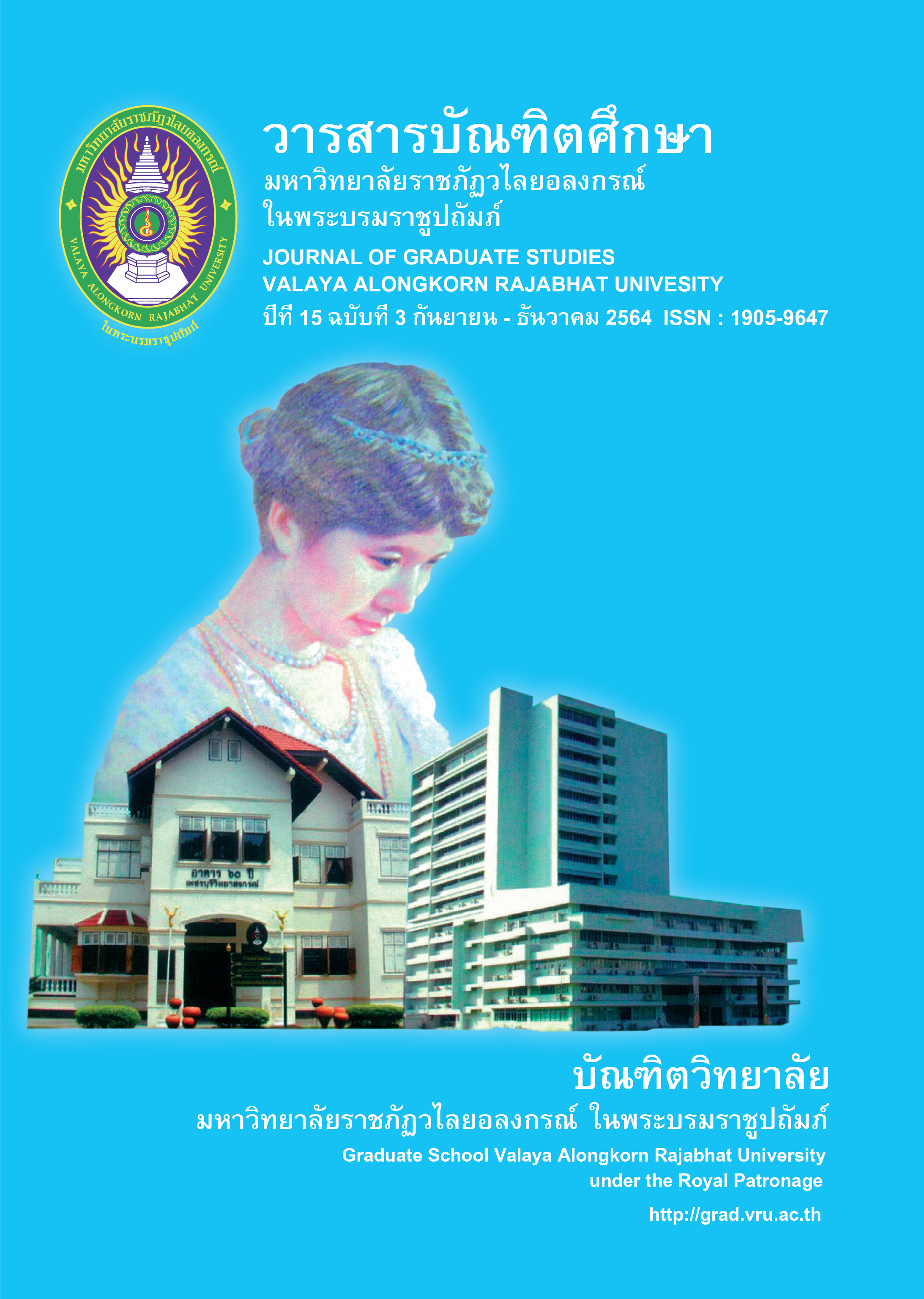THE IDENTITY OF THE CAFÉ HOPPING IN THAILAND THROUGH SOCIAL MEDIA
Main Article Content
Abstract
The identity of the café hopping in Thailand which is presented through social media is communicative and interaction phenomena. It arises from the use of the power of possession of resources they have, including photos, social media area, time, social capital, and information about cafes and drinks, led to the identity reconstruction of both personal identity and group identity and presented them through social media. Personal identity is created in different ways and then presented through narratives with texts and photos through social media. They use the social media area to meet their own needs, also change and negotiate identity following the popularity of society at a time. However, despite the difference in personal identity, individuals are also connected by the way of thinking about consumerism. It constructs the group identity of café hopping that is presented through social media, which is a group that usually has coffee drinking activities in favorite coffee shops to fulfill their happiness and satisfaction. Coffee drinking activities that are presented through social media are rituals that have been created and reproduced into a group identity. It can identify the tastes of the café hopping group, and also classify the café hopping group from the general public through daily consumption.
Article Details

This work is licensed under a Creative Commons Attribution-NonCommercial-NoDerivatives 4.0 International License.
บทความทุกเรื่องได้รับการตรวจความถูกต้องทางวิชาการโดยผู้ทรงคุณวุฒิ ทรรศนะและข้อคิดเห็นในบทความ Journal of Global of Perspectives in Humanities and Social Sciences (J-GPHSS) มิใช่เป็นทรรศนะและความคิดของผู้จัดทำจึงมิใช่ความรับผิดชอบของบัณฑิตวิทยาลัย มหาวิทยาลัยราชภัฏวไลยอลงกรณ์ ในพระบรมราชูปถัมภ์ กองบรรณาธิการไม่สงวนสิทธิ์การคัดลอก แต่ให้อ้างอิงแหล่งที่มา
References
Eyebanthita. (2020). khāfē Aree sutpang thāirūp sūai khanom ʻarō̜i sāi Cafe Hopping čha phlāt daingai [Cool Ari cafes, take great photos, delicious cakes, how could café hopping miss it]. Retrieved from https://shopee.co.th/blog/cafe-hopping-ari/
Facebook. (2020). #cafehoppingbkk. Retrieved from https://www.facebook.com/hashtag/cafehoppingth?__eep__=6&__cft__[0]=AZVe1CsZxvgjhKc7W4FBSKkA89mgYn_X89qrnnkii1qWvf-pvTaTXpi2ZBHV9SjK5j9Jqp9YEhKY31GahkWdzt0_foNCw2KP0cDhe7A3wIPufw&__tn__=*NK-R
Hecht, M., Warren, R., Jung, E., & Krieger, L. (2005). A communication theory of identity: Development, theoretical perspective, and future directions. In Theorizing about intercultural communication. (pp. 257–278). Thousand Oaks, CA: Sage.
Ho, T. & Lin, Y. (2016). The Effects of Virtual Communities on Group Identity in Classroom Management. Journal of Educational Computing Research. 54(1), 3-21.
Huang, J., Kumar, S., & Hu, C. (2020). Gender Differences in Motivations for Identity Reconstruction on Social Network Sites. International journal of Human–Computer Interaction. 34(7), 591-602.
Instagram. (2020). #cafehoppingbkk. Retrieved from https://www.instagram.com/explore/tags/cafehoppingbkk/
Instagram. (2020). #cafehoppingchiangmai. Retrieved from https://www.instagram.com/explore/tags/cafehoppingchiangmai/
Jenkins, E., Zaher, Z., Tikkanen, S., & Ford, J. (2019). Creative identity (re)Construction, creative community building, and creative resistance: A qualitative analysis of queer ingroup members' tweets after the Orlando Shooting. Computers in Human Behavior 101. (2019), 14-21.
Kaewthep, K. (1998). kānsưksā sư̄muanchon dūai thritsadī wiphāk: nǣokhit læ tūayāng ngānwičhai. [Mass Media study with Critical Theory: concept and research example]. Bangkok: Parbpim.
Kaewthep, K. et al. (2012). sư̄ kao - sư̄ mai: sanya ʻattalak ʻudomkān. [Old media - New media : Sign “Identity” Ideology]. Bangkok: Parbpim.
Kaewthep, K., Ninphung, K., & Jenjad, R. (2013). sư̄sān ʻāhān sukkhaphāp. [Communication Food Health]. Bangkok: Parbpim.
Liu, S. (2015). Searching for a sense of place: Identity negotiation of Chinese immigrants. International Journal of Intercultural Relations. 46(2015), 26-35.
Pootrakul, P. (2016). Self-Disclosure through Social Media: The Guideline for Study on Influential Factors and Effects. Journal of Behavioral Science for Development. 8(2), 1-16.
Prasitwisate, G. (2014). kānsư̄sān thun thāng sangkhom ʻō̜nlai phān fētbuk kap khunnaphāp chīwit nai lōk hǣng khwām čhing [The Communication and Online Social Capital of Facebook with Psychological Well-being]. Doctoral dissertation. Dhurakij Pundit University.
Ratjaroenkhajorn, S. (2001). rān kāfǣ: khwāmmāi nai watthanatham Thai yuk bō̜riphōk niyom [Coffeehouse: meanings in the cultural sphere of Thai consumerism]. Doctoral dissertation. Thammasat University.
Schpix. (2010). Coffee Hop. Retrieved from https://www.urbandictionary.com/define.php?term=coffee+hop
Scissors, L., Burke, M., & Wengrovitz, M. (2016). What’s in a Like? Attitudes and behaviors around receiving Likes on Facebook. CSCW. 16, 1501-1510.
Somthawinpongsai, C. (2018). patčhai thī mī ʻitthiphon tō̜ kān pœ̄tphœ̄i tonʻēng nai khrư̄akhāi sangkhom ʻō̜nlanai [Factors influencing self-disclosure in online social networks]. Pathumthani University Academic Journal. 10(2), 267-275.
Sriwong, M. (2020). nǣonōm thurakit kāfǣ mư̄ang Thai 2563 [Thai Coffee Business Trends 2020]. Retrieved from http://www.thaismescenter.com
Williams, B., & Zenger, A. (2012). New media literacies and participatory popular culture across borders. New York, USA: Walsworth Publishing Company.
Woradilok, C. (2016). khrư̄akhāi kānsư̄sān læ kānsāng ʻattalak khō̜ng klum phūbō̜riphōk ʻāhān khlīn [Communication network and the identity of clean food consumer]. Doctoral dissertation. Thammasat University.
Yeow, H., Kit, L., & Yen, N. (2014). Factors of Influencing Customer’s Return Patronage in Café in Klang Valley. Kampar: Universiti Tunku Abdul Rahman.


